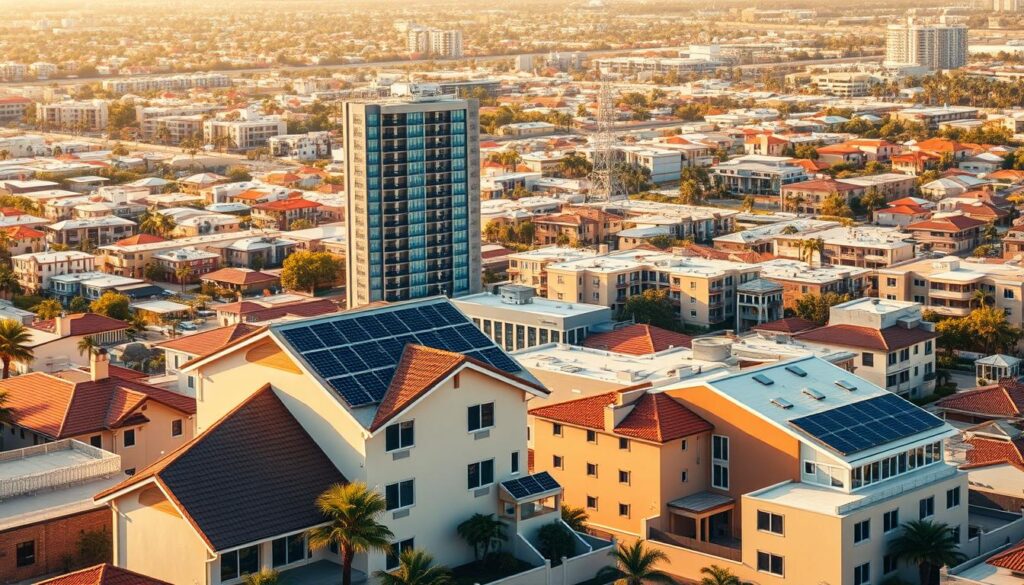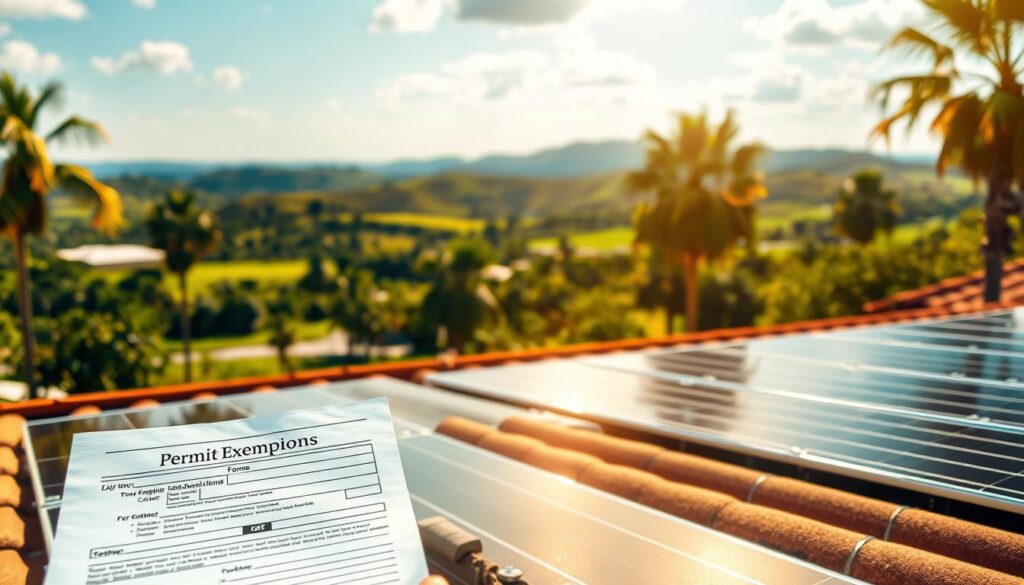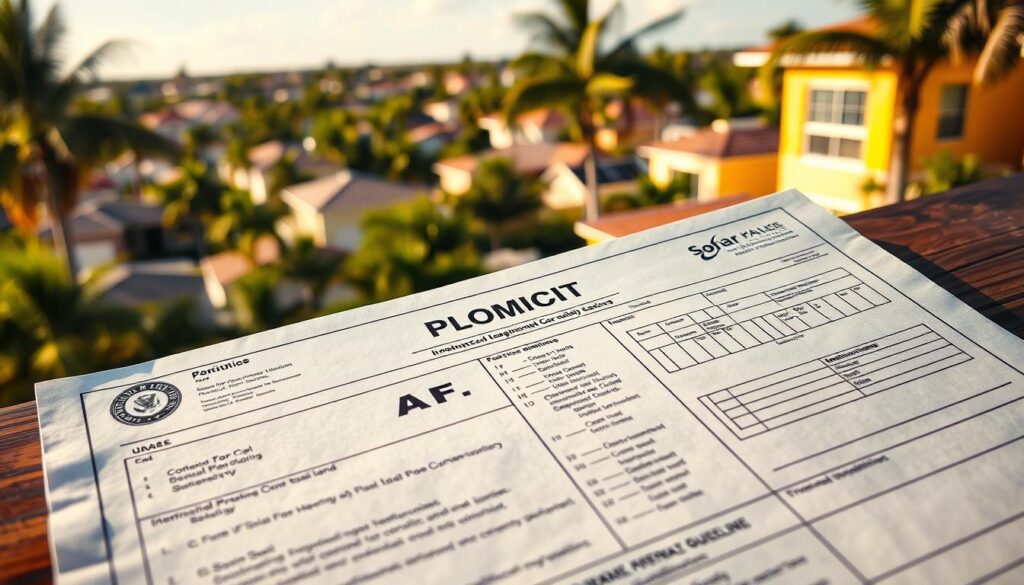Going solar in Florida means understanding Florida solar permits. Whether you’re installing roof-mounted panels or ground systems, permits ensure safety and compliance. Solar Bear Orlando notes that while the process has steps, it’s essential for long-term benefits. Permits protect homeowners and align installations with local laws.
Most jurisdictions require solar panel permit florida applications for all types of systems—from photovoltaic arrays to pool heaters. Even repairs might need approval in some areas. This guide breaks down requirements, costs, and timelines to simplify your journey.
Key Takeaways
- Permits are mandatory for all solar installations in Florida, including repairs and replacements.
- Three main permits—building, electrical, and zoning—are typically required.
- Processing times vary, from days for simple systems to months for complex projects.
- Post-installation inspections ensure compliance with safety and utility grid connection rules.
- Costs differ by location, but applications often require just one page of paperwork.
Introduction to Solar Panel Permits in Florida
Installing solar panels in Florida isn’t just about choosing the right panels—it starts with understanding Florida solar energy regulations. These rules ensure safety and compliance across the state’s diverse jurisdictions. From Miami to Tampa, every installation must follow solar panel permit requirements in Florida, even if details vary by county.
“The answer is yes—in most jurisdictions in Florida, permits are required for all solar panel types.”
The Florida solar energy regulations aim to simplify processes through tools like the Go SOLAR initiative. This program unites 14 Florida jurisdictions, enabling online permit applications for residential and small commercial systems. Key rules include:
- Tier 1 systems under 10kW qualify for streamlined permits.
- Rooftop installations must follow ASCE 7 guidelines, focusing on Roof Zone 1 slopes between 5° and 45°.
- Permits cost $150–$400, varying by location and system size.
Why the rules? Safety and quality matter. The design tool automates checks for NEC and Florida Building Code compliance, reducing errors. Homeowners often work with licensed installers like Monalee, who assess roof conditions and electrical setups before applying. Skipping permits risks fines or delays, but most applications are approved first-time when done right.
Florida’s process differs from states like California, where fees are capped. While some areas approve permits quickly, others take longer. Planning ahead—like applying in off-peak seasons—can speed up the timeline.
Why You Need a Permit for Solar Panels
Solar panel installation regulations exist to protect both your investment and your community’s safety. Let’s break down why permits matter most in Florida’s unique environment.
“Solar installs involve a lot of complex electrical work and are seen as a higher risk to people and property if they aren’t installed properly, so getting a permit is key.”
Understanding Local Building Codes
Florida’s building codes prioritize safety, especially in hurricane-prone areas like Miami. These codes ensure:
- Structural integrity for roofs and foundations
- Compliance with NEC 705.12D calculations for inverter sizing
- Proof from a Florida P.E. that systems won’t fail under hurricane-force winds
Even rooftop systems in Miami require proof they can withstand extreme weather. Ground-mounted systems might need land surveys too.
The Importance of Safety Regulations
Safety standards like UL Listed components prevent electrical hazards. Permits also:
- Ensure licensed contractors handle wiring and connections
- Protect homeowners from insurance claims being denied due to unpermitted work
- Prevent costly removal orders if installations violate codes
Over 1.47 million U.S. homes use solar, but未经approved systems risk fines. Permits turn your investment into a safe, legally recognized asset.
Types of Solar Panel Permits in Florida
Choosing the right solar panel permit depends on whether you’re installing systems for a home or business. Let’s break down how residential solar panel permitting and commercial solar panel permitting differ, plus how HOAs might affect your plans.
Residential vs. Commercial Permits
Residential solar panel permitting typically applies to single-family homes. These projects often follow streamlined processes, focusing on electrical and structural compliance. For example, photovoltaic (PV) systems require basic plan submissions, including roof diagrams and electrical layouts. Commercial solar panel permitting is more complex. Businesses and multi-unit buildings need detailed engineering reviews. Commercial applicants must provide sealed drawings for structural integrity, especially for large arrays. Solar water heating or pool systems also have unique rules—pool heating may fall under plumbing permits in some areas.

Special Considerations for HOAs
Florida law protects homeowners’ rights to install solar panels while allowing HOAs to enforce aesthetic guidelines.
HOAs can’t block solar installations but may require panels to match rooflines or avoid visible obstructions. Before applying, review your community’s covenants and collaborate with your HOA board to align designs with their rules. This avoids delays caused by disputes over placement or style.
- Residential projects: Ensure plans meet local electrical and building codes.
- Commercial projects: Budget for engineering fees and extended review timelines.
Whether you’re outfitting a home or business, understanding these distinctions ensures your application aligns with Florida’s guidelines and local requirements.
How to Obtain a Solar Panel Permit in Florida
Navigating the solar panel permit application process in Florida requires careful planning, but it’s designed to ensure safety and compliance. Let’s break down the essentials for obtaining solar permits in Florida step by step.
Step-by-Step Application Process
- Consult a licensed contractor to verify local requirements under Florida Statute 163.04(2), which protects homeowners’ rights to install solar systems.
- Submit a completed application, signed by both homeowner and contractor, with notarized signatures.
- Choose electronic submission via Broward County’s eConnect system (7-day review) or paper (15-day review). Applications must include sealed plans by a Florida-licensed engineer unless the project is under $50,000.
- Track your application status online or via customer service hours (Mon-Thu 7:30 AM-4:00 PM in Coral Springs).
Required Documents and Fees
Essential documents include:
- Two signed/sealed sets of plans (or three for paper applications)
- System specifications, riser diagrams, and wind load calculations (170 mph for hurricane zones per ASCE 7 standards)
- A completed Solar Equipment Attachment Affidavit submitted at final inspection
- Contract copy showing job value and payment terms
Standard fees vary by county. In Broward County, total costs average $432.02, covering electrical reviews, inspections, and surcharges. Fees rise with project complexity or value exceeding $5,000, requiring a Notice of Commencement recorded with the Clerk of Court.
Permits expire in six months if unstarted, and all work must finish within 18 months. Schedule required inspections (e.g., rough electric, final solar) before finalizing installation.
Solar Panel Permit Exemptions in Florida
Florida solar permits occasionally allow exemptions, but exceptions are rare and highly specific. Always confirm eligibility with local authorities before proceeding without a solar panel permit florida.
“Simple repairs of leaks, annual inspections, and minor repairs do not require permits,” states the Florida Solar Design Group. “But verify with your local office first.”
Here’s what qualifies for exemptions:
- Repairs under $2,500 for residential solar systems
- Temporary solar setups for disaster recovery by licensed organizations
- Owner-built homes under $75,000 (if not resold within a year)
- Solar panel replacements after emergencies declared by the state
- Projects under the DOE’s Rooftop Solar Challenge with licensed electricians
Even when exempt, benefits of securing a permit outweigh risks. Proper Florida solar permits ensure:
- Legal compliance and insurance coverage
- Higher resale value for homes
- Avoidance of costly fines or system removals
- Safety inspections to prevent electrical hazards

Exemptions rarely apply to commercial projects or new installations. Unpermitted systems risk rejection by insurers and may complicate future sales. Always consult local building departments to confirm eligibility.
Timeframe for Permit Approval
Obtaining solar permits in Florida varies widely based on location and project complexity. Solar Bear Orlando notes approvals can take 2–6 weeks in South Florida, while simpler systems may finish in as few as 5 days. Florida solar energy regulations require strict adherence to guidelines like the Florida Building Code, 7th Edition, which affects review timelines.
The timeline to obtain a solar permit will vary depending on the scope of your project and location.
Factors like incomplete applications or inspection scheduling delays can extend wait times. For example:
- Solar Panel Installation: 5-day turnaround (4 required reviews, 1 completed)
- Commercial Projects: 12-day turnaround (10 required reviews, 4 completed)
- Residential Remodeling: 12-day turnaround
| Permit Type | Turnaround | Reviews |
|---|---|---|
| Solar Panel Installation | 5 days | 4 required |
| Commercial Remodeling | 12 days | 10 required |
| Residential Addition | 12 days | 10 required |
Working with licensed contractors like those listed on the City of Pensacola’s website can shorten wait times. Their SolSmart Gold designation ensures faster processing. Submitting plans via the My Government Online portal and including a Notice of Commencement (for projects over $2,500) streamlines reviews. Aim for a smooth process by addressing all requirements upfront—this minimizes delays and keeps your project on track.
Common Challenges in the Permit Process
Navigating solar panel permit requirements in Florida can pose hurdles even for experienced installers. From paperwork snags to regional code differences, delays often arise when applications lack precise details or fail to align with solar panel installation regulations. Local inspectors may flag structural concerns, like roof stability in hurricane zones, adding to review times.
“Ignoring permit steps risks costly violations or resale issues down the line.” – Florida Solar Design Group

Addressing Delays and Denials
Common pitfalls include:
- Incomplete plans or missing engineering reports
- Non-compliance with wind load standards for coastal areas
- Fee discrepancies between municipalities
Tips for a Smooth Approval Process
Pro installers like GC Solar & Electric recommend:
- Verify local solar panel permit requirements in Florida with your county office first
- Include detailed roof load calculations for older homes
- Use online portals for real-time tracking
- Review utility company interconnection rules early
Avoid last-minute changes to panel layouts once applications are submitted. Proactive steps like pre-submission site visits and document reviews can cut approval times by up to 40% in some counties. Remember, clear communication with inspectors builds trust and speeds approvals.
The Role of Professional Installers in the Permit Process
Professional solar installers are essential partners in managing Florida’s solar panel permit application process. They simplify complex Florida solar energy regulations, ensuring projects stay on track while avoiding legal or financial risks.
Working with Licensed Contractors
Choose contractors licensed by Florida’s state board, requiring Electrical (EC) and CVC certifications. Their expertise ensures permits are filed correctly. As Solar Bear Orlando notes:
“When you work with our experienced solar team, we handle the entire solar panel permit application process, submitting permits and coordinating inspections.”
- They verify local fee structures and deadlines, often reducing delays.
- Established relationships with local inspectors speed approvals, cutting wait times.
Ensuring Compliance with Local Laws
Installers monitor Florida solar energy regulations, adapting to updates like new zoning rules or HOA restrictions. Their role includes:
- Reviewing site plans for code alignment
- Coordinating inspections to avoid rework
- Addressing HOA concerns through legal expertise
These professionals also keep pace with state initiatives, like Florida’s efforts to streamline permits online. Their oversight ensures systems meet safety standards, protecting homeowners from fines or project shutdowns.
Conclusion: The Benefits of Going Solar in Florida
Navigating Florida solar permits ensures compliance with solar panel installation regulations, but the rewards are worth the effort. Florida’s 237 sunny days each year make solar energy highly efficient. A 30% federal tax credit reduces initial costs, and systems like SunPower Maxeon panels last up to 40 years. Proper permits protect investments and ensure safety, leading to long-term savings. The average home in Florida saves $1,348 annually on energy bills. Solar Bear Orlando’s experts simplify the process, handling permits and installations smoothly. While the permitting process may take weeks, the result—a cleaner energy source and lower bills—delivers significant value. With incentives and rising energy costs, going solar today secures financial and environmental benefits for years to come.
Florida’s sunny climate and policies like net metering amplify these gains. Homeowners can slash energy use by 70%, and solar systems often pay for themselves in under a decade. By following local regulations and working with certified installers, residents can enjoy clean energy without sacrificing quality or savings. Start your journey today and join the growing number of Floridians embracing a brighter, more sustainable future.
